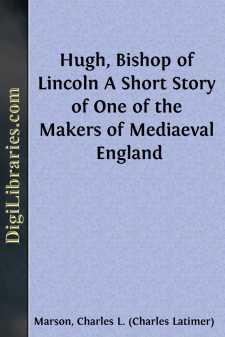Categories
- Antiques & Collectibles 13
- Architecture 36
- Art 48
- Bibles 22
- Biography & Autobiography 813
- Body, Mind & Spirit 142
- Business & Economics 28
- Children's Books 14
- Children's Fiction 11
- Computers 4
- Cooking 94
- Crafts & Hobbies 4
- Drama 346
- Education 46
- Family & Relationships 57
- Fiction 11829
- Games 19
- Gardening 17
- Health & Fitness 34
- History 1377
- House & Home 1
- Humor 147
- Juvenile Fiction 1873
- Juvenile Nonfiction 202
- Language Arts & Disciplines 88
- Law 16
- Literary Collections 686
- Literary Criticism 179
- Mathematics 13
- Medical 41
- Music 40
- Nature 179
- Non-Classifiable 1768
- Performing Arts 7
- Periodicals 1453
- Philosophy 64
- Photography 2
- Poetry 896
- Political Science 203
- Psychology 42
- Reference 154
- Religion 513
- Science 126
- Self-Help 84
- Social Science 81
- Sports & Recreation 34
- Study Aids 3
- Technology & Engineering 59
- Transportation 23
- Travel 463
- True Crime 29
Hugh, Bishop of Lincoln A Short Story of One of the Makers of Mediaeval England
Categories:
Description:
Excerpt
INTRODUCTION
In a short biography the reader must expect short statements, rather than detailed arguments, and in a popular tale he will not look for embattled lists of authorities. But if he can be stirred up to search further into the matter for himself, he will find a list of authorities ancient and modern come not unacceptable to begin upon.
The author has incurred so many debts of kindness in this work from many friends, and from many who were before not even acquaintances, that he must flatly declare himself bankrupt to his creditors, and rejoice if they will but grant him even a second-class certificate. Among the major creditors he must acknowledge his great obligations to the hospitable Chancellor of Lincoln and Mrs. Crowfoot, to the Rev. A. Curtois, Mr. Haig, and some others, all of whom were willing and even anxious that the story of their saint should be told abroad, even by the halting tongues of far-away messengers. The same kind readiness appeared at Witham: and indeed everybody, who knew already about St. Hugh, has seemed anxious that the knowledge of him should be spread abroad. It has snowed books, pamphlets, articles, views, maps, and guesses; and if much has remained unsaid or been said with incautious brusqueness, rather than with balanced oppressiveness, the reader who carps will always be welcome to such material as the author has by him, for elucidating the truth. If he has been misled by a blind guide, that guide must plead that he has consulted good oculists and worthy spectacle-makers, and has had every good intention of steering clear of the ditch.
Though what a man is counts for more than what he does, yet the services of St. Hugh to England may be briefly summed up. They were (1) Spiritual. He made for personal holiness, uncorruptness of public and private life. He raised the sense of the dignity of spiritual work, which was being rapidly subordinated to civic work and rule. He made people understand that moral obligations were very binding upon all men. (2) Political. He made for peace at home and abroad: at home by restraining the excesses of forestars and tyrants; abroad by opposing the constant war policy against France. (3) Constitutional. He first encountered and checked the overgrown power of the Crown, and laid down limits and principles which resulted in the Church policy of John’s reign and the triumph of Magna Carta. (4) Architectural. He fully developed—even if he did not, as some assert, invent—the Early English style. (5) Ecclesiastical. He counterbalanced St. Thomas of Canterbury, and diverted much of that martyr’s influence from an irreconcileable Church policy to a more reasonable, if less exalted, notion of liberty. (6) He was a patron of letters, and encouraged learning by supporting schools, libraries, historians, poets, and commentators.
Ancient authorities for his Life are:—(1) The Magna Vita, by Chaplain Adam (Rolls); (2) Metrical Life, Ed. Dimock, Lincoln, 1860; (3) Giraldus Cambrensis, VII. (Rolls); (4) Hoveden’s Chronicle (Rolls); (5) Benedicti, Gesta R. Henry II. (Rolls); (6) for trifles, Matthew Paris, I. and II. (Rolls), John de Oxenden (ditto), Ralph de Diceto (ditto), Flores Histor. (ditto), Annales Monastici (ditto); (7) also for collateral information, Capgrave Illustrious Henries (Rolls), William of Newburgh, Richard of Devizes, Gervase’s Archbishops of Canterbury, and Robert de Monte, Walter de Mapes’ De Nugis (Camden Soc). Of modern authorities, (1) Canon Perry’s Life (Murray, 1879) and his article in the Dictionary of National Biography come first; (2) Vie de St. Hughues (Montreuil, 1890); (3) Fr. Thurston’s translation and adaptation of this last (Burns and Oates, 1898); (4) St. Hugh’s Day at Lincoln, A.D. 1900, Ed. Precentor Bramley (pub. by Clifford Thomas, Lincoln, N.D.); (5) Guides to the Cathedral, by Precentor Venables, and also by Mr. Kendrick; (6) Archæological matter, Archæological Institute (1848), Somerset Archæolog. XXXIV., Somerset Notes and Queries, vol. IV., 1895, Lincoln Topographical Soc., 1841-2; (7) Collateral information—cf....


